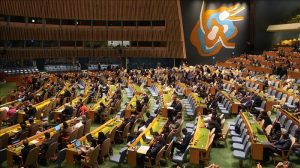The UN General Assembly on Sunday, September 22, 2024, unanimously adopted the Pact for the Future, along with its annexes, the Global Digital Compact and the Declaration on Future Generations.

The representatives from across the world committed to the Pact at the UN Summit of the Future, the landmark outcome of COP28, namely the tripling of renewable energy capacity and transition away from fossil fuels.
The comprehensive pact aims to strengthen global governance and tackle key challenges facing humanity, including sustainable development, international peace, and technological innovation, youth and future generations and transforming global governance. The pact also proposes detailed action plans to address these challenges.
General Assembly President, Philemon Yang, hailed the adoption as a “pledge to address immediate crises” and “lay the foundations for a sustainable, just, and peaceful global order.”
The Global Digital Compact outlines principles for an open and human-centred digital future, while the Declaration on Future Generations calls for recognising the rights of future generations in decision-making processes.
Yang emphasised the need for solidarity and multilateral cooperation in implementing the pact’s commitments. He described the upcoming Summit of the Future as a “call to action” to shape a future that protects both humanity and the planet.
In his address, UN Secretary-General, Antonio Guterres, said he called for the Summit of Future “because 21st-century challenges require 21st-century solutions” and “we need tough decisions to get back on track.”
Stating that the world is going through a time of turbulence and transition, Guterres said: “We cannot wait for perfect conditions.”
“We must take the first decisive steps towards updating and reforming international cooperation to make it more networked, fair and inclusive now, and today, thanks to your efforts, we have,” said Guterres.
Environment watchdog, 350.org, welcomes the reaffirmation of commitments made in Dubai but stresses that the real test will be the delivery of these in the coming days.
According to the group, leaders and ministers must commit to translating the COP28 outcome and PACT of the Future into concrete national targets and policies at the first-ever Global Renewables Summit, the UN General Assembly High Level Segment, and the COP Troika High Level event.
Andreas Sieber, Associate Director of Policy and Campaigns at 350.org, states: “Petrostates tried to derail the Pact for the Future but the outcome of COP28, transitioning away from fossil fuel and tripling renewables still stands and is the new norm we so desperately need. As countries prepare to unveil their emissions targets, world leaders have one job to do: deliver 1.5-aligned climate goals – no compromises.
“This means a bold break from fossil fuel dependency and rich countries must support those already suffering the harshest impacts of climate change. Azerbaijan and Brazil, as future UN climate summit hosts, must show us their ambition and leadership. The world is ready to see the bold blueprint that the Pact for the Future intends to deliver. We are watching, and we expect bold commitments, and even bolder action.”
350.org is calling on world leaders to implement the UAE consensus – transitioning away from fossil fuels in line with 1.5, meaning an average 6% decline in fossil fuels this decade, and a tripling of renewables.
